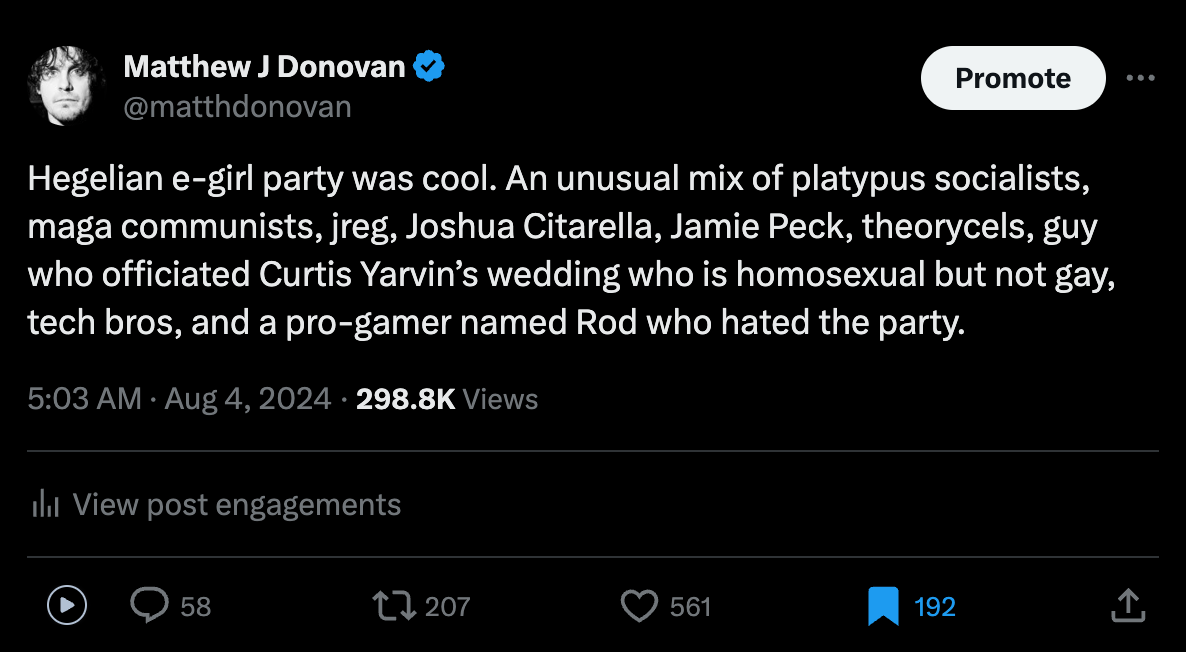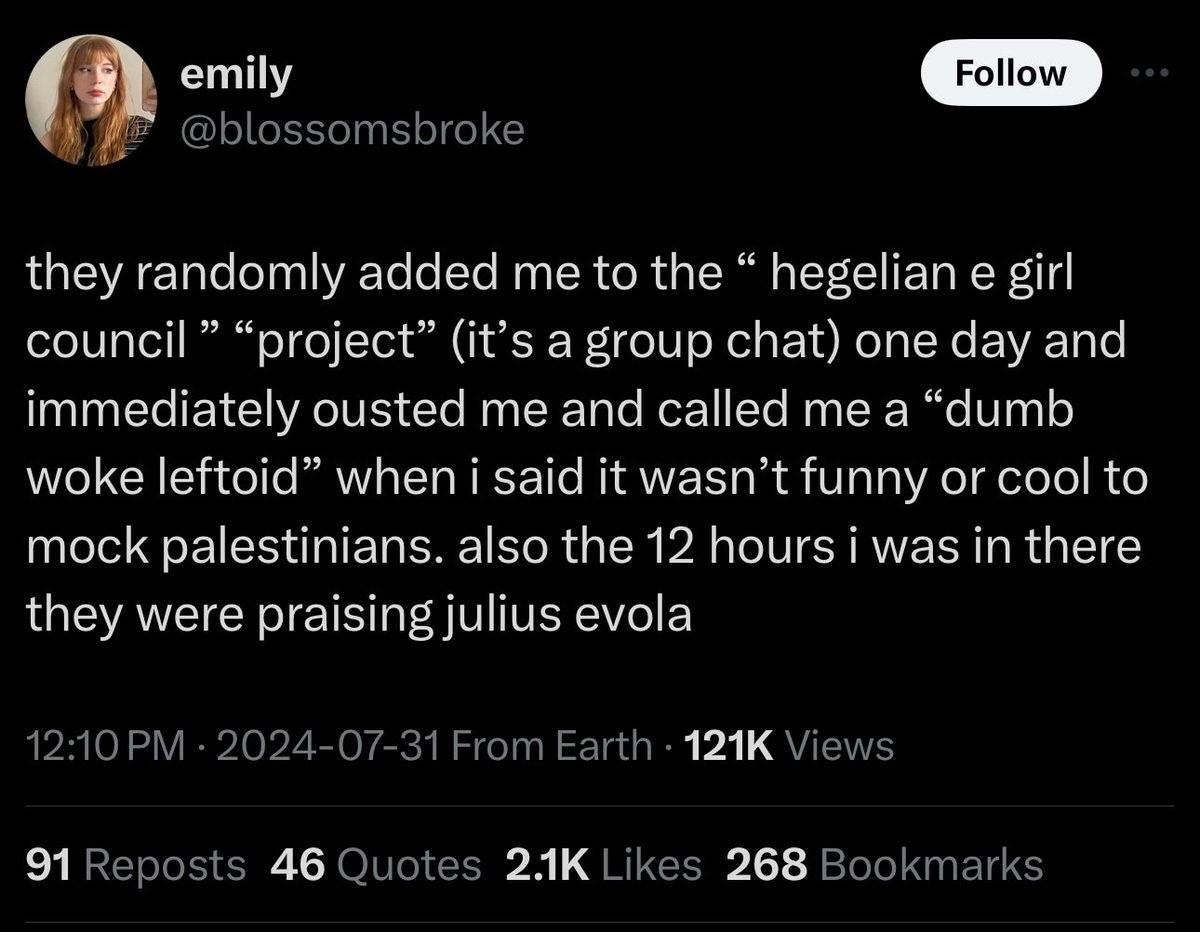I Hosted the Hegelian E-Girl Party and All I Got Was Called a Fascist.
And wrote this because people kept on asking "what is a Hegelian E-girl?". I try to answer that question.
Note: Both this Substack post and the original tweet were recently archived on KnowYourMeme.com.
The Hegelian E-Girls only innovation was a new form of grift in Dimes Square. It all started when the public-turned-VIP party began as a rumor and unfolded like a staged confession. Attendance required a golden ticket—a "VIP" guest list spot, the kind of thing that feels both exclusionary and contrived, as though by limiting access they could imbue the event with something it otherwise lacked. The stated rationale was a bomb threat, whispered about in fragmented threads of doubt and certainty. Some swore it was real; others dismissed it as a PR gimmick—a nod, intentional or not, to the angelicism stunt, that ill-fated film premiere with its own staged threats. But no one seemed genuinely afraid. The organizers went so far as to pay my actor friend to heckle a symposium at the party, and they recruited hosts like me at an event featuring none other than Norm Finkelstein. I agreed, though I had no idea what I was agreeing to—something to do with theory, something to do with communism, all funneled through a group chat called Laetitia, where everyone talked like they were performing excerpts from a half-forgotten manifesto.
By the time the event happened, its viral presence had already ensured the room would be packed. If one could even call it that, the party felt more like an experiment in ideological theater than a gathering meant for pleasure. The engagement was cursory, and the gestures of discourse were more about display than depth. A few members of the Platypus Affiliated Society showed up but left early, their absence marked only by a pile of pamphlets abandoned on a sticky table. The MAGA Communists lingered longer, their presence more meme than movement. Yet they carried a strange gravitational pull, an association with the Infrared Collective led by Haz. I was told he had even spoken at a Schiller Institute event, lending Infrared an unsettling aura of coherence in a space otherwise defined by its inconsistencies on the surface but ultimately just right-wing tankies.
The HEGs (Hegelians, I guess?) leaned heavily on Haz’s framework, such as it was. Their claims of political pluralism were cloaked in deliberate ambiguity, a bait-and-switch tactic aimed at drawing in anyone dissatisfied enough to gamble on the vague promise of synthesis. I admit I was intrigued by the rhetoric, curious about the seduction of its opacity until someone offhandedly mentioned that one of their members had troll-harassed my friend Jamie Peck. Another friend stepped in to diffuse the situation, which, as it turned out, was more embarrassing than threatening. That sums up the night: less danger, more awkward posturing, a halfhearted collision of big ideas and petty grievances. It was an ideological cocktail, but no one could remember the recipe.
Leftish commentators like Jreg, J.J. McCullough, Crumps, Ross Wolfe, and Joshua Citarella lurked about, seemingly out of morbid curiosity rather than serious engagement. Most attendees were there to socialize—non-political but perhaps hyper-online, enjoying the free alcohol and DJs like Twitter personality Dull under the neon light of a hammer and sickle. To put this in perspective, I later discovered that the restaurant space is rented out by the owner, who was involved in the Iranian Revolution. After the event, he quipped that the so-called communists had ideas that didn't seem very communist to him. It's amusing how all these groups (Platypus, Maga Communism, and the like) get tangled up in their own definitions that people part of the historical project would reject!
Everyone I asked concluded it was a fantastic party with lively discussions across opposing viewpoints. My friend Mary E. Vogt, equally clueless about the Hegelian e-girl phenomenon, said she could chat openly without fear of sparking a heated debate—though I did witness several, including one guy shouting, "Don't ad hominem me!" before storming off. For instance, the person I quibbled with, a MAGA communist who believed the MAGA movement would unite the working class and bring about a workers' revolution, citing North Korea as a model of communism.


It doesn’t make you noble or transgressive or even particularly brave to mingle with those who don’t see the world as you do—it just makes you human, perhaps even curious, maybe a touch wiser. An Oxford study recently laid bare the stark reality of our information silos: liberals and conservatives alike, steeped in their respective echo chambers, are more inclined to dig in their heels than open their minds when confronted with opposing beliefs. It’s not just dogma that calcifies under such conditions; it’s the ability to imagine that you might be wrong, or even that you might be bored by your own correctness.
There’s a smarter move here, though it’s not without its risks: allow your epistemic bubbles to burst. Let in a little air, a little light, a little of someone else’s stifling nonsense. Yes, it’s unnerving to sit at a table where people laugh at jokes you find horrifying, or where the terms of debate feel like a trapdoor under your feet. But what’s more alienating than living in the certainty that the only acceptable stance is orthodoxy? Even the heterodox have their echo chambers.
Of course, there’s the risk of guilt by association. Attend a party where reactionaries drink toasts to "tradition," and you may come home branded a fascist by people who claim to know you well enough to label you but not well enough to speak to you. The word itself—“fascist”—once sharp and biting, now feels worn down by overuse, like an old coin rubbed smooth until its imprint is barely legible. At some point, every exchange turns into a parody of itself: Godwin’s Law not just of the internet but of life.
I didn’t realize at first that the HEGs—some kind of half-ironic intellectual clique—were a front for MAGA Communism. (Don’t ask; I’m still not entirely sure what that means.) It turned out the implication was that every attendee, by virtue of proximity, was a fascist in disguise, the kind of logic that makes your head spin if you dwell on it too long. But honestly? I’d rather risk being called a fascist than be consigned to a life spent parsing the world through the narrow vocabulary of liberal indignation. At least, for better or worse, the conversation might be interesting.
Hilariously, politics barely entered the conversation, though it hovered like a phantom in the room, its outlines blurred by irony and the thrum of knowing laughter. Most people were too busy mocking the MAGA Communism meme to bother with the labor of debate. Hanging out with your ideological opposites doesn’t brand you a traitor these days—more like a connoisseur of nuance, someone who’s transcended the suffocating strictures of 2018 purity tests to bask in the absurdities of it all. I’ve laughed at this posture with others steeped in political advocacy, like my friend Geeta Minocha, a lawyer devoted to the seemingly archaic cause of public banking. Of course, many weren’t there for the politics at all, but for the spectacle—to gawk, to hate-watch, to feel something in the presence of the ridiculous.
The political ones, though, were a different breed. A glinting, messy alloy of affect and ambition, each one clawing to distinguish themselves from the others in a landscape that feels like it’s running out of landscapes. Post-left, non-ideological, vaguely horseshoe-shaped, their politics bristled with cryptofascist vibes but wore them like a chic accessory—a little edge to set off the ensemble. It’s a kind of end-of-history couture: leftism is so 2015, wokeness now means you don’t say the “n-word” (or at least not in public), and let’s be honest, even you feel the gravitational pull of reactionary hot takes once with their sour whiff of realness. Now, the realness is so downstream; you can feel the shift as the provocations are rehearsed, the ironies infinite, the compass pointing everywhere at once. And yet, they play the part so well—self-conscious enough to mock the role, sincere enough to make it stick. It’s all theater, but then again, what isn’t? It’s so over.
Matty Colquhoun, aka Xenogothic, dubs it an “edge-lording trend,” a mutation of the post-left scene that congealed in 2018 London—names like people who follow this Substack like Nina Power and Justin Murphy drifting through its slipstream. By now, though, its anti-woke offspring have been fully absorbed into the cultural mulch of Dimes Square, where the ghost of Gavin McInnes looms large. McInnes—punk provocateur turned alt-right progenitor—is the Rosetta Stone for this entire moment. The drift is predictable, almost banal: contrarianism courting power, rebellion crystallizing into reaction, punk sold off to the industry man. New Atheists. The Intellectual Dark Web. Please be kind and rewind. The same tired choreography, every time.
Not that this was some high-minded theorycel confab—though the HEC Council crowd, once in the orbit of the theorycel group chats, might have wanted you to think so. Even Hunter Hunt-Hendrix has distanced herself, tossing out the cryptofascist label in what passes for a mea culpa (as we discuss). But let’s be honest: the ideological mix was as predictable as it was incoherent. Dugin. Nick Land. Evola. Yarvin. Žižek. Christianity, why not. Logo Daedalus—sure, throw him in. This kind of playlist nods knowingly toward depth while skimming a Wikipedia surface. Nikki, one of the founders, insists they’re not just another Dimes Square (DS) vanity project:
“Dimes Square is a dead-end of expression and hedonism—rich kids in a liberal circlejerk, prancing about without transcending their own conditions. It’s all right-wing aesthetics as a shallow critique, a reverse wokeness where radical liberalism preserves their hedonistic party-drug culture. Our project seeks substantive impact and genuine consequences.”
Update: As of November 20th, 2024, there is no longer any such thing as Hegelian E-girls. They have all renounced the project, which has become a meme of history or a “Dimes Square Vanity Project.”
You could argue that Nikki’s critique deserves more attention. Fine. But let’s not pretend it’s not also a bit hilarious, given that the event she’s dissecting was essentially a themed party—a Pinterest board come to life, self-funded and suffused with enough ideological detritus to choke an algorithm. The real centerpiece wasn’t intellectual rigor or political revelation but vibes: an accessory to the same Red Scare-adjacent milieu that everyone insists on pretending is edgy. Meanwhile, Mike Crump’s writing—dismissed by some as just another riff on downtown contrarianism—at least tries to grapple with the sheer boredom of it all, the suffocating predictability of irony-as-praxis.
One could argue that Nikki hasn't received enough credit for her insightful critique. However, her analysis should alarm anyone who prefers these so-called reactionaries—who are just like Hillary Clinton-style opportunists—to keep up their charade. It’s a bit like that surreal moment when Russian political theorist Aleksandr Dugin vexed Americans on late-night TV. Asked to explain his allegiance to an authoritarian kleptocracy masquerading as a federation, he served up the kind of response that should make even the most irony-poisoned post-leftist wince: Russians, he insisted, don’t just tolerate Putin—they want him to double down. Authority, order, national strength—it’s not oppression, Dugin sneered; it’s culture, something Western liberals, marinating in their own fantasies of humanistic governance, are too myopic to grasp. The host blinked, smiling faintly, as if Dugin had just recommended a particularly obscure French wine. The audience laughed nervously. The world turned. Funny enough, MAGA Communists want this too.
As I am writing this, the next day, it took a sad interpersonal turn. I learned about the "e-girl council" defection: Sanje Horah’s quip that leftist ideas weren’t taken seriously, such as in the case of Morgan on Twitter or Emily gripe about being tagged a "dumb woke leftoid" for objecting to Palestinian mockery while Evola was lauded1. This underscored the event’s zero-stakes nature—attendees could leave, unscathed and unaffected, but the two main organizers, who seem to be the only real members of the council seem to leave some scars on their friends. I’m sure this wasn’t their intention, they seem like perfectly nice people from my experience, events of this nature often lead to fallouts even, but sadly, this is likely how most online will remember the HEC.
Regarding Hegel, HEC isn’t igniting a "vibe shift" so much as curating a dialectical bordello—a Hegelian pastiche where contradiction becomes a commodity. Sublation morphs into memes, parties, and Žižekian theatrics: Evolian mysticism brushed with Marxist gloss, luxuriating in the decadence they decry, orbiting bourgeois aesthetics while disavowing proletarian struggle. Their project stages transcendence as Instagrammable kitsch, trading rupture for spectacle, with NYC as prop and Hegel as a brand, fragmented and subsumed into the machinery of self-aware decadence.
As my friends responded to my original article in opposing ways, Sean Kennedy said, “parties won’t save us,” while Willow argued they might offer a brief refuge for solitary, stranded heterodox thinkers. Imagine a space where people from incompatible or antagonistic political backgrounds collide—like subatomic particles in a cerebral collider—generating not just heat but new social realities. This clashing of affinities embodies a raw Hegelian idea: a dialectical risk where perspectives ricochet, fuse, and mutate. It transcends a mere social event, becoming a space for humbly reckoning with our own delusions or a crucible for having the conversations we've been afraid to have. These encounters might dissolve in sudden laughter, paranoia, unimagined new positions, or, in rare cases, the ultimate freedom of permanent idiocy.
In the end, the HECs snagged their fleeting memeification, their theory-soaked theatrics rippling through Twitter and landing on the shores of academic Facebook—a purgatory of aging minds less fluent in the semiotics of irony. Hardly progress, but then, who said progress was the point? The Hegelian E-Girls will resurface, no doubt, because ideas this absurdly self-aware are rarely content to fade quietly.
Other Blogs on The Same Party
Interview on The Antifada Podcast
Interview on Mutual Abberation Society
Ross Wolfe, Founder of the Marxist Facebook Group Aftermath
Mike Crumps, Scene Reporter on the New Right
For those who read this to learn about Hegel, it’s best to start with primary sources like Phenomenology of The Spirit, join a reading group to struggle through the hard texts, and also modulate between primary and secondary texts. Ross Wolfe, founder of the Marxist Facebook group Aftermath, recommends Herbert Marcuse's series of essays on Hegel, "Reason and Revolution."
2024. X (Formerly Twitter). 2024. https://x.com/sanjehorah/status/1820166653226725734.









Dusty calling Jreg a “fascist” is absolutely ludicrous. He’s basically the Zoomer Weird Al Yankovic of internet meme ideologies. He’s barely a political figure at all. I personally interpret his real purpose as advocating for Christian communitarian localism, and for disengagement from social media. He doesn’t have any grand political ambitions. I mean, if that’s “fascism,” then that word has lost all meaning.
I needed this post in my life lol thank you. Insightful, hilarious, vaguely depressing